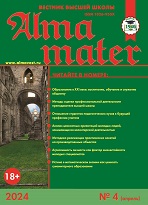https://doi.org/10.20339/AM.12-17.054
M.Yu. Osipov is Cand.Sci. (Jurisprudence), senior researcher at Institute of Jurisprudence & Management of VPA e-mail: osipov11789@yandex.ru
Researched is the problem of using latest informational technologies in university. Actuality of the problem is conditioned by the fact, that modern student is living constantly in informational environment, from which he derives necessary information. The aim of the research is to show, how the newest informational technologies are being used for organization of training of students, and also to identify factors, that prevent the use of latest information technology in training of students. The object of the research are latest informational technologies, which are being used in the course of teaching students and organizing of educational process at university. Also the author suggests a number of measures, that are conductive to introduction of newest informational technologies at high school.
Key words: newest information technologies, organization of training, students, faculty staff, quality, contemporary higher education.
References
- Federal law of 29.12.2012 N 273-FZ (red. 30.12.2015) “On education in the Russian Federation”.
- Borodinova, E.V. Activation of cognitive activity of students at studying of economic subjects. In: Topical issues of higher professional education and modern Russian society. Tula, 2013, pp. 5–7.
- Vlasov, A.I. Introduction into flash technology. URL: http://citforum.ru/internet/flash_intro/index.shtml
- Vitchenko, O.V. Interactivity as one of the basic requirements of modern electronic educational resources. International journal of experimental education. 2013, no. 4, pp. 66–68.
- Geta, A.V. Ways of using multimedia technologies in training of students. In: Problems of economy and informatization of education. Tula, 2015, pp. 23–29.
- Zavarzin, S.V., Anichkina, G.A. Distance education technological prospects. In: Topical issues of higher professional education and modern Russian society. Tula, 2013, pp. 17–20.
- Zavarzin, S.V., Zavarzina, T.V. Bases of the content of specialist training. Modern problems of law, economics and management. 2015, no. 1, pp. 200–203.
- Lutsenko, T.P. Use of elements of information technologies in educational process at correspondence. In: Materials of 12th International scientific practical conference. Tula, 2015, pp. 66–69.
- Nivinskaya, O.A. Situational training in formation of professional competence of specialists in the hospitality industry. Vestnik of Tomsk state pedagogical university. 2013, no. 11, pp. 128–131.
- Pakhomova, V.G. Project activity is an effective means of increasing motivation of pupils at lessons of a foreign language. URL: http://festival.1september.ru/articles/601616/
- Pinskaya, M.A. Formative assessment: assessment at the classroom. Moscow, 2010.
- Solovieva, L.F. Computer technology for teachers. St. Petersburg, 2003.
- Chernilevsky, D.V. Didactic technologies in higher education. Moscow, 2002.
- Chumachenko, I.V. Formation of the adaptive project team. Management of projects on development of employed. 2011, № 2 (38), pp. 67–71.
- Schafer, D.F. Software project management: achieving optimum quality at minimum cost. Moscow, 2004.











.png)






